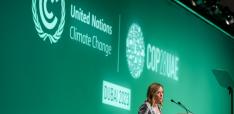America First and the Fragmentation of Global Health: How Africa can Reimagine Its Agency

Nelson Aghogho Evaborhene argues that a multipolar landscape opens space for innovation, accountability, and more legitimate governance.
For two decades, global health spoke the language of solidarity. From pandemic preparedness to universal health coverage, health was framed as a shared responsibility beyond borders. That landscape has shifted. The recently released America First Global Health Strategy signals that global health is now primarily an instrument of U.S. national security and geopolitical competition, rather than collective survival.
This strategy continues a trajectory begun under Trump, with the U.S. withdrawing from the WHO and dismantling key USAID programs. Once a central pillar of the global health system, the United States now centers engagement on security, domestic resilience, and strategic interests. Health is no longer a universal public good; it is a tool of power.
Flagship initiatives such as PEPFAR, the Global Fund, and the President’s Malaria Initiative projected health as moral diplomacy, combining vast resources with a commitment to equity. They saved millions of lives and strengthened health systems. Yet COVID-19 exposed the fragility of this consensus: wealthy nations hoarded vaccines, imposed export bans, and monopolized access to essential technologies. Solidarity yielded to security. “America First,” once exceptional, became the global norm.
These dynamics intersect with broader geopolitical shifts: the return of U.S.–China–Russia competition and the reassertion of security as a strategic ideal. While the pandemic did not create these shifts, it magnified them, revealing that the global health order was far less global—and far less equitable—than many assumed.
The U.S. strategy therefore formalizes a process already underway: the erosion of the post–Cold War consensus that positioned Western donors as moral and financial stewards of global health. Multilateral institutions like WHO, the Global Fund, and Gavi remain critical but face constrained authority, their priorities increasingly shaped by high-income countries’ security concerns. Declining aid and increased military spending in Europe further reinforce this vulnerability. For African countries, the conclusion is stark: without agency, equity remains largely rhetorical.
Building a New public health Order in Africa
Amid these geopolitical and institutional transformations, as Okereke argues, “Africa is not powerless.” The continent is redefining health security through the African Union’s New Public Health Order (NPHO), championed by Africa CDC, which seeks to strengthen self-sufficiency and amplify Africa’s voice in global health
The idea crystallized at the height of the COVID-19 pandemic, when the continent’s reliance on external supply chains exposed structural inequities. In September 2022, the vision was formally endorsed at a high-level UN General Assembly side event. Its five pillars are: (1) strengthening public health institutions, (2) expanding local manufacturing of vaccines and medical supplies, (3) developing a skilled health workforce, (4) promoting domestic health investment, and (5) fostering equitable partnerships. COVID-19 transformed these pillars from aspiration into action, as Africa CDC coordinated the continental response, launched pooled procurement mechanisms, and catalyzed vaccine production.
The post-pandemic period has seen the consolidation of these gains. In February 2022, the Africa CDC was elevated to an autonomous agency by the AU, granting it the authority to declare Public Health Emergencies of Continental Security. This power was exercised in August 2024 during the mpox outbreak, enabling rapid mobilization of resources. Parallel reforms strengthened institutional and financial architecture: the African Epidemic Fund was launched in February 2025 for predictable African-led financing, and the African Medicines Agency advanced regulatory harmonization to expand access to locally produced medical products.
Building on this momentum, in August 2025, under Zambian President Hakainde Hichilema, the AU endorsed the Continental Framework for Cholera Elimination, aiming to eradicate cholera by 2030. In response to populist retrenchment and shifting global health geopolitics that same month, the Accra Reset Meeting, convened by Ghana, refined implementation pathways for the NPHO. The “Durban Promise,” adopted at the Fourth International Conference on Public Health in Africa in October 2025 is the latest manifestation of pan-African solidarity.
Collectively, these developments reflect a continental ambition to strengthen health security. Calls for an African Union Health Architecture aims to enhance coordination among AU health agencies. Yet without enforceable mechanisms to translate both continental and global commitments into action at the national and regional levels, even the most carefully crafted principles risk dissolving into summit fatigue
Pandemic Peer Review Mechanism: Institutionalizing Accountability
To consolidate this vision, the Africa CDC should spearhead the creation of a Pandemic Peer Review Mechanism (PPRM)—modelled on the African Peer Review Mechanism (APRM).
Established in 2003 under the New Partnership for Africa’s Development (NEPAD), the APRM has functioned as a voluntary, self-assessment and peer-learning framework through which AU Member States evaluate governance, transparency, and socio-economic performance. Its reviews, conducted by African experts and endorsed at Heads of State level, have strengthened national institutions, improved policy coherence, and enhanced civil society engagement.
A similar model for health would institutionalize political accountability, serving as an oversight body to track the implementation of continental health commitments—whether arising from AU summits, the Accra Compact, or the Pandemic Agreement.
Crucially, the mechanism would link performance not only to access to resources under the African Epidemic Fund but also to donor resources. By tying external support to demonstrable adherence to African-defined priorities, the PPRM articulates a “vision of partnership: one in which external support strengthens rather than supplants national systems and accountability is mutual rather than one-sided”. This coupling of accountability with financing transforms continental commitments into tangible outcomes, embedding Africa’s strategic health priorities into both regional and global funding flows.
Financing and the Politics of Autonomy
The institutional progress under the NPHO highlights the critical importance of financial independence. While the African Epidemic Fund represents a deliberate move toward predictable, regionally owned financing, states must match commitment with actual capitalization. In this regard, domestic resource mobilization through earmarked levies, sovereign health bonds, or pooled risk funds will be essential. The Fund’s success will depend on transparent governance, rapid disbursement, and equitable allocation.
Complementing the Fund, the African Financial Stability Mechanism (AFSM), adopted by AU Heads of State in February 2025, provides another structural approach to unlock fiscal space for health investment. By refinancing sovereign debt at lower rates, the AFSM is expected to generate approximately US$20 billion in fiscal savings for Member States by 2035. Allocating a portion of these resources to continental health initiatives—co-managed with Africa CDC and the African Development Bank—would enhance both the financial autonomy and operational capacity of the NPHO.
Technology, Manufacturing, and the Quest for Health Sovereignty
At the same time, Africa’s engagement with global partners must shift from dependency to negotiated interdependence. Domestic ambition, embodied in the Partnership for African Vaccine Manufacturing, requires not only infrastructure and workforce development but also enforceable technology-transfer agreements. As of mid-2024, 25 vaccine manufacturing initiatives are underway, including Afrigen Biologics in South Africa, which, in partnership with the WHO mRNA Technology Transfer Hub, developed an mRNA vaccine prototype. This milestone advances continental goal of reducing vaccine imports from 99% to 40% by 2040. Regulatory frameworks are also progressing: the African Medicines Agency is harmonizing product approvals, and eight countries have achieved Maturity Level 3 under the WHO Global Benchmarking Tool.
To strengthen supply chains, the AU and Regional Economic Communities launched the African Pooled Procurement Mechanism. Complementing this is the African Vaccine Manufacturing Accelerator (AVMA), launched in June 2024 by Gavi in response to the AU’s call for at least 30% of vaccines procured for Africa to be locally produced. AVMA provides long-term financing and market incentives to accelerate manufacturing.
However, without access to appropriate technology, these initiatives will face challenges. As critics note, “financial incentives based on worn-out market thinking will not deliver.” Although, the African Development Bank’s African Pharmaceutical Technology Foundation (APTF), established in Kigali in 2023, seeks to bridge critical gaps in local manufacturing and innovation, global frameworks—including the newly adopted Pandemic Agreement—lack concrete commitments on technology-transfer.
While African delegations in Geneva advanced provisions on equitable access, legal, financial, and political asymmetries limited the outcomes. Once-binding clauses on IP waivers and royalty-free licensing were replaced with vague, non-binding language. The Independent Panel on Pandemic Preparedness and Response warns these caveats provide ground for inaction, exposing the gap between representation and enforceable gains.
Building on the Common African Position on the Pandemic Agreement, adopted by the AU in 2024 and reinforced in 2025, African negotiators must push, in alliance with Global South coalitions, for concrete technology-transfer provisions in the ongoing Pathogen Access and Benefit-Sharing discussions. Effective implementation would not only strengthen health security but also advance the AfCFTA and Agenda 2063 objectives.
Fragmentation or Renewal?
Some observers warn that the decline of U.S. leadership and the rise of regionalism will lead to fragmentation. These are valid concerns. A world of competing sovereignties can easily devolve into a patchwork of self-interested actors.
Yet fragmentation can also be generative. A multipolar landscape opens space for innovation, accountability, and more legitimate governance. Regional mechanisms such as the Africa Medical Supplies Platform demonstrate how collective continental action can accelerate access. If adequately resourced, these regional efforts can complement rather than compete with global institutions. The challenge then, is ensuring that regional efforts do not reproduce inequities within the continent. Wealthier Member States must commit to solidarity mechanisms to ensure equitable participation.
For the Global North, Africa’s growing cohesion under the NPHO alters the calculus. What was once a donor-recipient relationship is becoming a negotiation among equals. Yet predictable resistance will follow: attempts to fragment African unity through selective partnerships, dilute commitments via “voluntary” frameworks, and reassert control through intellectual-property regimes. The only durable response is countervailing leverage—anchoring all external engagement within AU-led mechanisms and demanding reciprocity. In this new order, Africa’s scale is its strength: a collective market of 1.4 billion people gives the continent not just moral authority, but economic gravity.
The upcoming G20 Leaders’ Summit in Johannesburg, offers a vital platform to advance African priorities on global health reforms, linking pandemic preparedness, health sovereignty, and equitable financing to broader agendas on climate finance, debt-relief, and inclusive growth.
In an era of resurgent nationalism and geopolitical fragmentation, Africa’s ability to act collectively, negotiate as a bloc, and assert its priorities will determine whether it remains a site of competition or emerges as an actor of consequence in global health governance.
Nelson Aghogho Evaborhene, PhD Fellow, Centre for Interdisciplinary Study of Pandemic Signatures, Roskilde University.
Photo by Shedrack Salami


